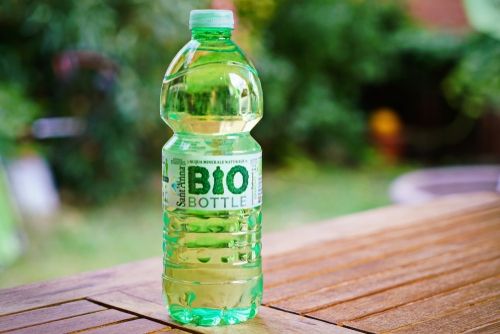Researchers at Bath University in the United Kingdom say they have developed a new way to break down plant-based plastics, also known as biopolymers, into their original “building blocks,” potentially allowing products to be recycled repeatedly without a loss in the quality of the plastic.
Plastic scrap recycling in the U.K. is on the increase, say the researchers, but one of the problems with current plastic recycling methods is that plant-based polymers such as polyactic acid (PLA) often are not welcome in the mechanical recycling stream.
“You end up with a lower quality plastic with worse properties than the original,” the researchers say of PLA in the packaging stream. “This means that plastic drinks bottles cannot simply be recycled into new drinks bottles continuously but instead are used for other lower grade products, such as water pipes, park benches and traffic cones.”
The scientists, which include those at the University of Birmingham, say they have developed a new way of chemical recycling — converting PLA plastics back into constituent chemical molecules — so they can be used to make “new plastics of the same quality as the original.”
The research team has described its method in an article in the Germany-based publication ChemSusChem. They say the method uses lower temperatures and more environmentally friendly catalysts than previous methods.
“Most plastic is currently recycled using mechanical methods, where they are chipped into granules and melted down before being molded into something new,” comments Professor Matthew Jones of the Centre for Sustainable & Circular Technologies at the University of Bath.
“The problem is, melting plastic changes its properties, and reduces the quality, which limits the range of products in which it can be used,” he continues. “Our method of chemical recycling overcomes this problem by breaking down plastic polymers into their chemical building blocks, so they can be used all over again to make virgin plastic without losing any properties.”
PLA, which is made from starch or crop waste instead of from petrochemicals, is used in biodegradable food packaging and disposable cutlery and cups.
“PLA is being increasingly used as a sustainable alternative for single-use plastics,” states Paul McKeown from the University of Bath, listed as first author of the research paper. “Whilst it’s biodegradable under industrial conditions, it doesn’t biodegrade with home composting, and isn’t currently recycled, so at the moment it commonly ends up contributing to the tons of plastic waste in landfill and oceans.”
Adds McKeown, “There is no single solution to the problem of plastic waste – the approach has to be a combination of reducing, reusing and recycling. Our method of chemical recycling could allow carbon to be recycled indefinitely – creating a circular economy rather than digging more up from the ground in the form of fossil fuels, or releasing it into the atmosphere as a greenhouse gas.”
So far, the technology has only been demonstrated on a small scale, but collaborators at the University of Birmingham are currently working to scale up the system to produce larger quantities of necessary catalysts or starting chemicals.
The U.K. research team says it also has started experimenting with a similar process for recycling PET (polyethylene terephthalate), which is widely used for beverage bottles and in other packaging applications.
Source: www.recyclingtoday.com
Packaging 360 is a comprehensive knowledge sharing ecosystem for the Indian packaging industry. Our services include an online content platform to deliver news, insights and case studies; organising conferences seminars and customised training; Providing Bespoke Project Consulting, Market Research and Intelligence.







